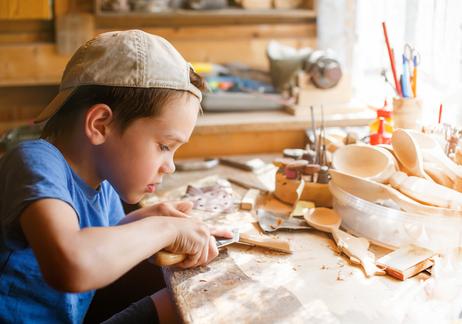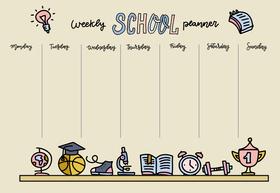Educating Your Gifted Child
We parents worry a lot, don't we? From the time of your baby's first kick in the womb to her graduation from college, her marriage, and the birth of her own children, we just never stop worrying, do we? Now, of course, I don't mean worrying in a negative sense. I use worry to express that parental awareness or sixth sense, which we parents remarkably seem to develop from the time we first hold our child in our arms. Worrying goes with parenting. But let's make it informed worrying. That's why organizations such as The National Association For Gifted Children are so important.
This video discusses the parenting of gifted children.
As you begin to suspect that your child might be gifted, take time to review the information contained on an authoritative website such as the NAGC's. Ruthlessly filter information that you see on television, hear on talk shows, or read in social media.
So, what makes a child gifted? The NAGC lists the following common characteristics of gifted children:
- Unusual alertness, even in infancy
- Rapid learner; puts thoughts together quickly
- Excellent memory
- Unusually large vocabulary and complex sentence structure for age
- Advanced comprehension of word nuances, metaphors, and abstract ideas
- Enjoys solving problems, especially with numbers and puzzles
- Often self-taught reading and writing skills as a preschooler
- Deep, intense feelings and reactions
- Highly sensitive
- Thinking is abstract, complex, logical, and insightful
- Idealism and sense of justice at an early age
- Concern with social and political issues and injustices
- Longer attention span and intense concentration
- Preoccupied with own thoughts—daydreamer
- Learn basic skills quickly and with little practice
- Asks probing questions
- Wide range of interests (or extreme focus in one area)
- Highly developed curiosity
- Interest in experimenting and doing things differently
- Puts ideas or things together that are not typical
- Keen and/or unusual sense of humor
- Desire to organize people/things through games or complex schemas
- Vivid imaginations (and imaginary playmates when in preschool)
This video helps answer the question of whether or not your child is gifted.
While not every child will exhibit all of these characteristics, this list will serve as a starting point and a helpful guide. Supporting your child's endless curiosity and exploration takes time, patience, and continual affirmation. You cannot be a part-time parent of a gifted child. Encouraging your child to read and to use her imagination is an essential part of developing her gifts. For a snapshot of what you are in for, read Nancy Delano Moore's article The joys and Challenges in raising a Gifted Child.
An equally important part of the process is socializing your young, gifted child so that she can handle the more complex issues that arise in the middle and high school years. That's when things get interesting. Your child already knows that she is different. Being different adds pressure to conform to what society considers normal. That is why it is so important to make sure that she is comfortable with herself. Adolescence brings additional pressures that can shake her self-esteem and self-confidence. Mary-Elaine Jacobsen's article Tips for Parents: The Real World of Gifted Teens offers some valuable insights and is worth a read.
Because a gifted child's curiosity is insatiable, you must provide lots of age-appropriate enrichment. Our eldest daughter was a gifted child. She read voraciously from a very early age, guided always by her mother, who was a voracious reader of several languages. Our daughter grew up thinking it was normal to read books and use a substantial vocabulary. I still chuckle about an incident that occurred in nursery school. Our daughter looked upset about something. When her teacher asked what the problem was, our daughter stated, "The other children are being obstreperous." She knew what the word meant at age 3.
The gifted child is often a perfectionist. She wants to get everything right. Anything less than perfection is a problem. That's where your calm, steady hand comes in as you explain that perfection is very difficult to attain. Shaun Hately's article Perfectionism and the Highly Gifted Child offers perspective on a trait which affects many gifted children.
Enrichment
How should you enrich your gifted child's learning and growth? That's a tricky question to answer definitively because each child is unique. For example, if your child shows exceptional prowess and interest in the piano, find a teacher with the experience to teach and mentor her. Always expect the unexpected with a gifted child. This is the 21st century, full of possibilities and opportunities that probably didn't exist when you were growing up. I am thinking of a gifted nephew of mine who played the piano very beautifully through his teenage years and then went on to be a record promoter.
We always felt that teaching modesty was important when raising our gifted daughters. Modesty, tolerance, and compassion are commendable attributes, in my opinion. We raised our children accordingly.
The gifted adult? Unfortunately, some talented adults can be insufferable. Very few have the personality of Stephen Hawking, to name just one incredibly talented adult.
Selecting Schools
What about schools for gifted children? By the time you have researched preschools, elementary schools, middle schools, and high schools for your child, you will most likely be an expert on finding the right school for your child. That is the secret to success when educating your gifted child. Not every school or every teacher is capable of dealing with a gifted child. But keep looking until you find that rare combination of flexibility and competence. The school must be flexible enough to allow your child to move at her own accelerated pace with subjects in which she excels and displays aptitude. The teachers must be competent enough to give your child the guidance and attention she needs in the requisite subject areas. Be forewarned. You will not find this kind of very specific information on a school's website. You must visit the school and discuss your needs and requirements. Then observe classes and teachers to satisfy yourself that the school can do what you need. Finally, remember that you cannot abrogate your responsibility for educating your gifted child. You know her better than anyone. Be prepared to make changes and adjustments as time goes on.
This short video discusses teaching gifted students.
Questions? Contact us on Facebook or Instagram. @privateschoolreview























